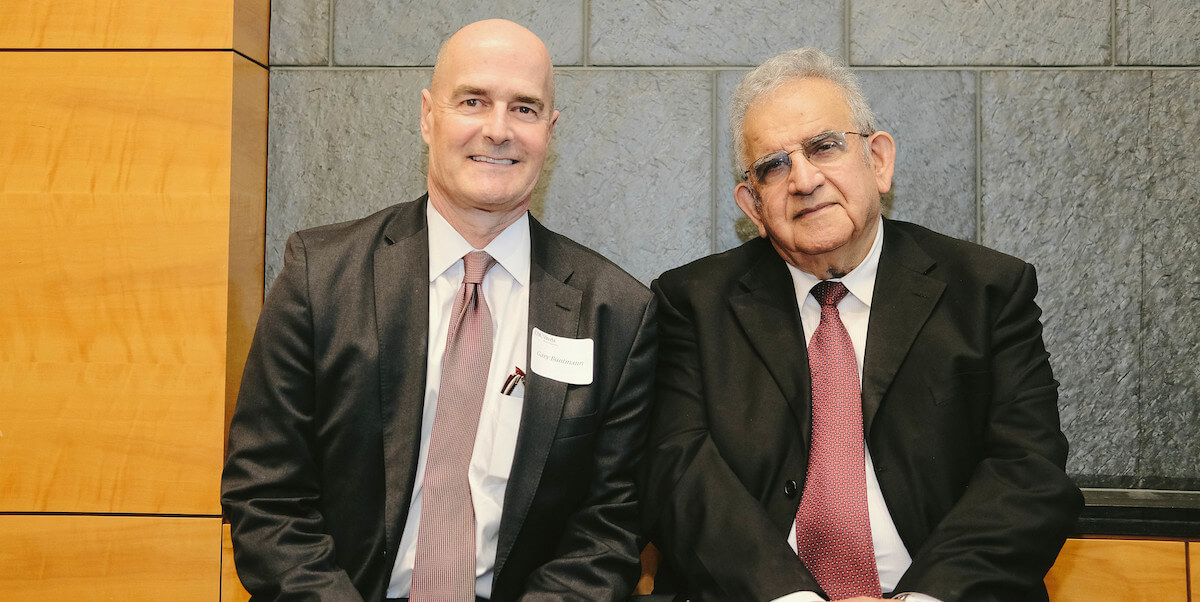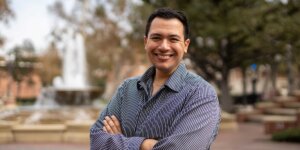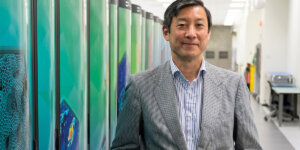
Alumnus Gary Buntmann with his former Professor Iraj Ershaghi. A gift from his Buntmann and his wife Mary, supported the new Ershaghi Center on Energy Transition (E-CET).
There was excitement and a sense of urgency last week at the formal launch of the Ershaghi Center on Energy Transition (E-CET). The center, as USC Viterbi School of Engineering Vice Dean for Research Mahta Moghaddam stated in her opening remarks, intends to bring “together thought leaders in academia and industry to collaborate on research and educational programs that will foster major efforts towards a low carbon future.”
At the launch event on campus, USC Energy Institute Director Don Paul, echoed what many in the room were likely thinking, “I do not think there could be a more important time to establish a center around energy transition.”
An energy industry veteran, Paul emphasized,“Nothing is more important to the functioning of the world than energy. The industry has a dual challenge of providing energy that the world needs but one that also has to evolve.”
The goal of supporting this center at USC with his wife Mary, said donor, Gary Buntmann, was to create a “modern energy center.”
Recognizing the imperative, Buntmann implored, “Could there be a more important initiative?”
Buntmann, a USC Viterbi and USC Marshall alumnus, also recognized the unique privilege that our society has at this juncture today and the responsibility to give back. “The responsibility lies with the roughly billion people on the planet who have flourished with a higher standard of living due to readily available, abundant energy. That’s us—to…service the approximately three billion more people who are living in energy poverty, who are desperate for reliable energy sources, and who are deemed more vulnerable to higher carbon footprint cast by others,” Buntmann said.
Iraj Ershaghi for whom the Center was named, and who was Buntmann’s professor, recognized the challenges inherent to energy transition towards low carbon-dioxide emissions. In his remarks, he referenced how this sense of anxiety has been present throughout human history with the introduction of new technologies (including energy transitions) for example, from wood to coal, and from coal to petroleum. Ershaghi reflected that the transition to new energy sources would also bring new opportunities and new innovations, a challenge that E-CET will undertake head on.
E-CET will pull from the expertise across the university to address such challenges as sustainability, while promoting security, and enriching life, said USC Viterbi Dean Yannis C. Yortsos.
A chemical engineer, Dean Yortsos explained that the Center will bring the school’s fundamental expertise to advance renewable energy, while recognizing how integral energy is to the fabric of our life. He said that sustainability advances lie at the intersection of water, energy and materials.
“[E-CET] will focus on processes to reduce substantially the carbon footprint and to help make renewable energy sustainable, powerful and plentiful,” Yortsos said.
Published on April 13th, 2022
Last updated on April 13th, 2022











